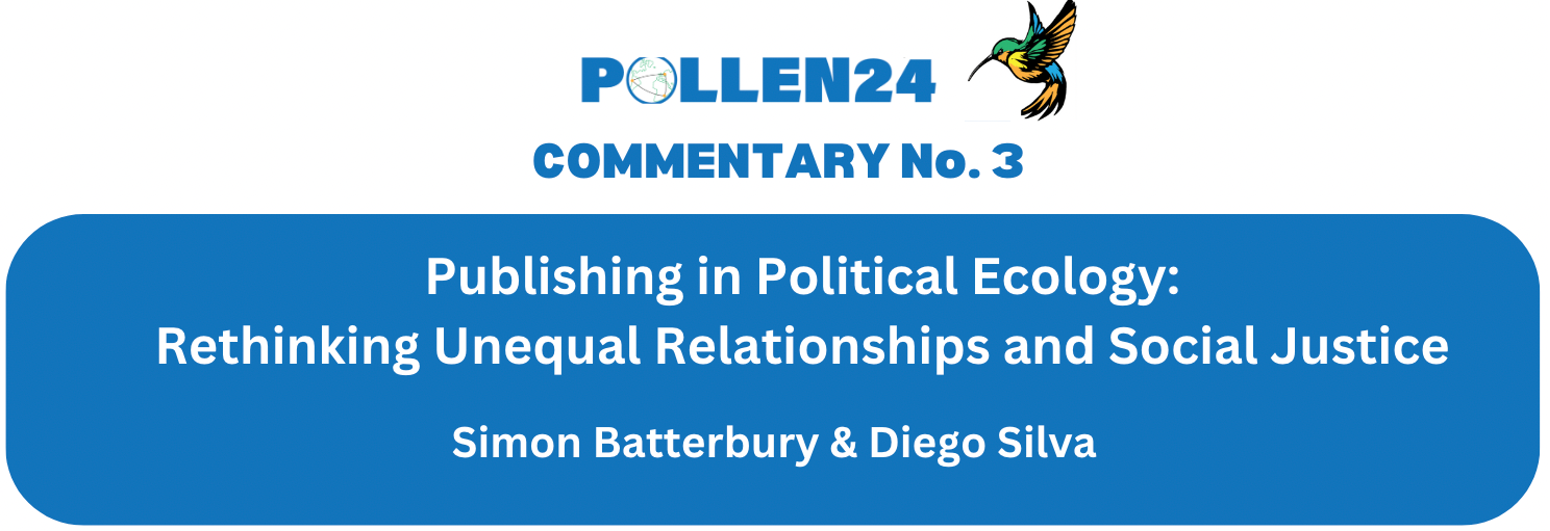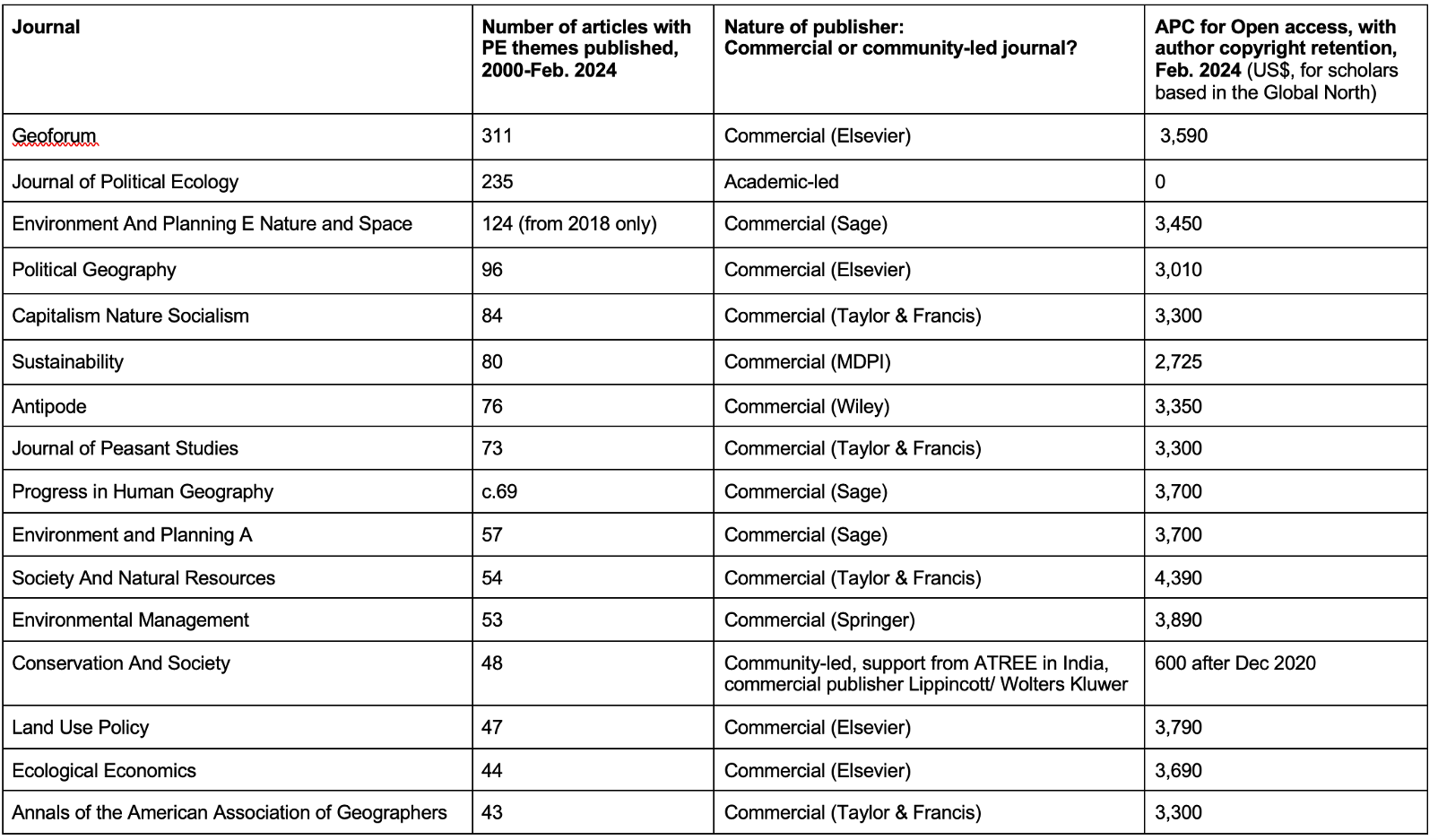2024-04-06
Publishing in political ecology: rethinking unequal relationships and social justice

Abstract
A synthesis of a chapter coming out in the Routledge Handbook of Political Ecology (2nd ed.)
Introduction
We focus on scholarly publishing in political ecology and the possibilities for reform. Currently, publishing for articles and books is highly unequal, expensive in different ways, and therefore discriminatory. Scholarly social science publishing is dominated by metrics, high expectations, and outlets that favour the commercial academic publishers despite a welcome shift to Open Access (OA). Political ecologists are passionate people, but they are commonly part of this system. A serious consideration of alternatives is needed. Alternative venues for academic work have emerged requiring our support.
Publishing… and political ecology publishing
As most readers will know, articles across the social sciences are mostly published by five major corporations (Elsevier, Springer Nature, Wiley & Sons, Taylor & Francis, and Sage), although newer entrants like MDPI are challenging them [3] (Hanson et al 2023). Most operate very substantial profit margins. Elsevier alone generated US$3.35 billion revenue in 2022, and CEO Erik Engstrom was paid over £6m (US$7.3m) in 2022 including benefits. Profits of the group regularly exceed 35% (RELX 2022 p. 124; Batterbury 2018). The other four companies have lower margins but are still for-profit. They have tried to maintain margins despite a shift to OA publishing (e.g. RELX 2022).
We argue that the shift to commercial OA disadvantages political ecologists in the Majority World because of high APC fees. ‘Ability to pay’ one-time APCs (Author Processing Charges) is now a major concern (Batterbury, Wielander, & Pia 2022) and we should, by acting ethically, direct our work elsewhere, where possible.
Table 1 shows the places where most political ecology scholarship is published, in any language. Only the Journal of Political Ecology [4] (Diamond Open Access, no fee) and Conservation & Society [5] (Indian journal with a small APC) are not-for-profit, with Water Alternatives [6], (APC $350) just outside this list. The average author charge per article for these 16 journals is US$3,112. There are discounts and waivers available, but these vary between journals and publishers.

Table 1. Most common political ecology article publication venues in English, 2000-Feb. 2024. Source: Scopus search, articles with PE in title, abstract or keywords. Costs from publisher websites, 26 Feb 2024.
_
Western universities/national research institutions have responded with Transformative Agreements (TAs) with commercial publishers, permitting OA publication for their staff. Because commercial publishers “have a huge financial stake in transitioning the system to a pay-to-publish model to maintain their significant profits” (Shearer, 2022) there is still a significant flow of money from universities to them, with journal subscriptions replaced by APCs (Batterbury 2020). Globally, not all institutions can afford this continued “commodification of knowledge” (Becerril García, et al. 2023, 194). The result is that radical and anti-corporate PE scholarship is still published in outlets bundled in decidedly lucrative commercial agreements, with little or no price transparency. This seems wrong. And poorer institutions simply cannot afford TAs where they are priced to underwrite corporate surplus.
While many political ecologists publish books, this sector is also changing (Gandy 2023). Those presses are slowly transitioning to OA, impelled by new mandates from funders, but Book Publishing Charges (BPCs) are payable to the commercial presses (US$5,000-$16,000 is not uncommon). Fortunately, there are alternative non-commercial presses (Batterbury, et al. 2024).
The response, and alternatives
Very few political ecologists have forsaken commercial journals publishing in English, as Table 1 shows. The structure of jobs and promotions in universities dictates this (Batterbury et al. 2024; Connell 2019; Severin et al. 2020). “The current career-evaluation and incentives system for researchers is toxic. Chasing impact factors and the aim/necessity of attaining a high number of papers in ‘ranked and indexed international journals’ is still a driving force for scholars across the world” (Legge, 2023).
A credible alternative to aggressively commercial publishers is to support community-led OA (Bosman et al. 2021). The sector runs on principles of fairness and conviviality, and is largely cost free to authors and readers. There are 11,000 OA diamond open access journals listed in the DOAJ [7], with about 45% published in Europe and a quarter in Latin America. Some 60% of OA diamond journals operate only with volunteers (Bosman et al. 2021, p32.).
Across the Hispanosphere and the Lusophone world things are already done differently. There are many established academic-led OA journals including Desenvolvimento e Meio Ambiente[8] and Ambiente e Sociedade[9]. The anglophone world has proceeded with this model more slowly (Becerril-García et al. 2023) but Batterbury’s listing[10] of community OA journals has informtion on outlets in political ecology and related fields. Also, organisations like Redalyc[11], SciELO[12] and AmeliCA[13] capture, curate and archive Open Access material (Colodrón, 2018). They support their constituent journals and presses, fighting for free or low-cost open access publishing.
Publishing ethically in political ecology means remaining skeptical of the lucrative publications ‘game’, which is controlled by largely anglophone corporates, legitimated by national research systems, and by senior scholars overseeing hiring and promotions. Employers should sign up to initiatives like the DORA Declaration[14], to make the evaluation of research performance much fairer. Work is then assessed by its quality, not by the venue it is published in. But uptake has been slow.
We can also produce our own journals and other outlets. Learning about publication is not part of doctoral training or career advancement. Social justice publishing (Batterbury 2020) means donating time to the global political ecology commons: in ways that are pluriversal, anti-racist, decolonised and feminist, depending on the nature of the work undertaken. Some of these contributions can be paid, where universities or national research entities fund journals and presses. Voluntary labour and editing, the "labour of love" (Pia et al. 2020) best suits those in secure employment and with sufficient time and attention to detail.
The Journal of Political Ecology[15] and Grassroots[16] are where we donate our own time and expertise. As Table 1 shows, JPE is an island, or perhaps a disruptor, in the field. With the Degrowth Journal[17] and Undisciplined Environments[18] they are highly dependent on greater input into a global commons ethos by political ecologists themselves.
Conclusion
It is disturbing that “In many countries, the ownership and control of scientific publishing by the academic sector have been lost” (Becerril García et al. 2023:192). We need to treat political ecology as a convivial social field, and volunteer more time to its outlets, as well as producing scholarship. Conventional commercial outlets are not the most appropriate venues for political ecology scholarship, even as their corporate owners are trying to maintain market share.
The argument is an ethical one. There is a clear disconnect between holding a progressive political position that challenges the political economy of injustice, and supporting Western-based corporations (through our APCs) driven by large payouts to top executives and shareholders. We recommend a change in expectations and practices (Batterbury 2020).
Author-side costs (APCs) are the major hurdle we now face, as Table 1 illustrates. There are alternative publication outlets and in some of these we can contribute our own labour and support. The publication process in political ecology needs to address the inequalities we have mentioned here, and to forge a more egalitarian pathway by altering publication expectations, assisting and targeting the community-led diamond OA sector, and treating publishing in political ecology as a social contract. We need a mass movement toward socially just publishing.
Notes
[1] Simon Batterbury is Professor of Environmental Studies at the University of Melbourne, Australia: Visiting Professor, Lancaster University, UK.
[2] Diego Silva is a Researcher at the Centre of International Environmental Studies, Geneva, Switzerland
[3] See Dan Brockington's (2022) blog post, https://danbrockington.com/2022/11/10/mdpi-journals-2015-2021/
[4] https://journals.librarypublishing.arizona.edu/jpe/
[5] https://journals.lww.com/coas/pages/default.aspx
[6] https://www.water-alternatives.org/
[7] https://doaj.org/
[8] https://revistas.ufpr.br/made
[9] https://www.scielo.br/j/asoc/
[10] https://simonbatterbury.wordpress.com/2015/10/25/list-of-decent-open-access-journals/
[11] https://www.redalyc.org/
[12] https://www.scielo.org/
[13] http://amelica.org/index.php/en/home/
[14] https://sfdora.org/
[15] https://journals.librarypublishing.arizona.edu/jpe/
[16] https://www.grassrootsjpe.org/
[17] https://www.degrowthjournal.org/
[18] https://undisciplinedenvironments.org/
References
Batterbury SPJ. 2020. Open but unfair- the role of social justice in Open Access publishing. LSE Impact of the Social Sciences. Spanish: Abierto pero injusto: el papel de la justicia social en las publicaciones de acceso abierto. SciELO.
Batterbury, S.P.J., Wielander, G., & Pia, A. E. 2022. After the Labour of Love: The incomplete revolution of open access and open science in in the humanities and creative social sciences. Commonplace. https://doi.org/10.21428/6ffd8432.5e24d46d
Batterbury S.P.J., A. E. Pia, G. Wielander & N. Loubere. 2024. Against Book Enclosures: Moving towards more diverse, humane, and accessible book publishing. Area 00, 1-8. https://doi.org/10.1111/area.12916
Becerril García, A., Aguado López, E., and Macedo García, A. 2023. Perspectives of the Latin American non-commercial journal publishing and South-South collaboration before commercial business models for Open Access. ACCESS, 2, 191-199. https://doi.org/10.3126/access.v2i01.58993
Bosman, J, et al. 2021. OA Diamond Journals Study. Part 1: Findings. Zenodo. https://doi.org/10.5281/zenodo.4558704
Colodrón, V. 2018. Why open access publishing is growing in Latin America. Times Higher Education. https://www.timeshighereducation.com/blog/why-open-access-publishing-growing-latin-america
Curcic, D. 2023. Academic publishers statistics. Wordsrated, 21 June. https://wordsrated.com/academic-publishers-statistics/
Farley, A. et al. 2021 Transformative agreements: Six myths, busted. College & Research Libraries News, 82, 7, p. 298. https://doi.org/10.5860/crln.82.7.298
Gandy, M. 2023. Books under threat: Open access publishing and the neo-liberal academy. Area, 00, 1–6. https://doi.org/10.1111/area.12877
Hanson, M. A., Gómez Barreiro, P., Crosetto, P. and Brockington, D. 2023. The strain on scientific publishing. arXiv arXiv:2309.15884
Legge, V. 2023. Report from Equity in Open Access workshop #2: Why do professors pick paywalls? OASPA
Pia, A.E., S.P.J. Batterbury, et al. 2020. Labour of Love: an Open Access Manifesto for freedom, integrity, and creativity in the humanities and interpretive social sciences. The Commonplace https://doi.org/10.21428/6ffd8432.a7503356
RELX 2022 Annual report, RELX Group.
Severin, A., M. Egger, M. P. Eve & D. Hürlimann. 2020. Discipline-specific open access publishing practices and barriers to change: An evidence-based review (Version 2), F1000Research, 7.1925. https://doi.org/10.12688/f1000research.17328.2
Shearer, K. 2022. Transformative agreements are not the key to open access. Times Higher Education, 9 Aug.
